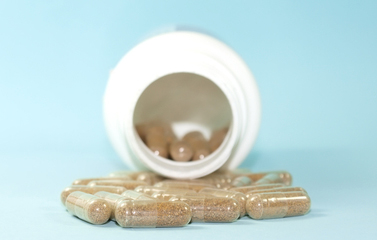The Best Muscle Recovery Supplements
 The older you get, the more likely you are to experience aching, sore muscles and fatigue after exercise. While good nutrition and hydration, along with a consistent exercise routine, can help to prevent some of this, supplementation with certain natural compounds can also make a significant difference. Muscle recovery supplements such as pine bark extract (Pycnogenol) and L-carnitine can help you recover from exercise and even improve your fitness.
The older you get, the more likely you are to experience aching, sore muscles and fatigue after exercise. While good nutrition and hydration, along with a consistent exercise routine, can help to prevent some of this, supplementation with certain natural compounds can also make a significant difference. Muscle recovery supplements such as pine bark extract (Pycnogenol) and L-carnitine can help you recover from exercise and even improve your fitness.
Pycnogenol is an effective natural supplement for improving exercise recovery and overall fitness performance levels. Supplementation with this highly potent antioxidant, an extract of French maritime pine tree bark, reduces muscle soreness, boosts muscle performance, and increases endurance, according to results from a recent study published in The Journal of Sports Medicine and Physical Fitness.[1]
The clinical trial found that Pycnogenol reduced muscle cramping and soreness by controlling oxidative stress. Oxidative stress is one of the primary ways in which exercise can hinder the body’s ability to repair muscle damage, especially as we age. It is caused by an imbalance between antioxidants and pro-oxidants (reactive oxygen species). During exercise, reactive oxygen species are generated by contracting skeletal and heart muscle.[2] The more oxidative stress that builds up with exercise, the more soreness, weakness, and fatigue a person may experience.[2]
The two-part Pycnogenol study evaluated the effects of this supplement in both normal subjects and in semi-professional athletes. The normal subjects, 32 to 36 years old, performed exercises based on the Army Physical Fitness Test (APFT) which evaluates physical fitness levels through muscular strength, endurance, and cardiovascular performance. Testing included counting the number of sit-ups and pushups a participant can complete in two minutes and the time it takes to run two miles. The semi-professional athletes were tracked while completing an average 100-minute triathlon.
Improvements with Pyconogenol
Compared to the normal participants who did not take Pycnogenol, those who took 100 mg per day for eight weeks:
- significantly decreased their two-mile run finish time by an average of nearly two minutes
- significantly increased their two-minute push-up endurance by an average of 25 percent
- significantly increased their two-minute sit-up endurance by an average of 15 percent.
Meanwhile, half the triathletes took 150 mg of Pycnogenol per day for four weeks. Participants were tracked over four weeks and evaluated by an average 100-minute triathlon consisting of a .47 mile swim, a 12-mile bike ride, and a 5k run.
The participants who supplemented with Pycnogenol:
- Significantly increased speed and strength (100 minute triathlon time: 1:40:24 to 1:29:44)
- Significantly reduced muscular cramping
- Controlled oxidative stress.
Overall, the participants of both trials significantly reduced training-induced muscular pain and oxidative stress and also increased their level of physical fitness.
Other muscle recovery supplements
In addition to Pycnogenol, other natural muscle recovery supplements have been tested in human clinical trials and found to be effective for reducing post-exercise muscle soreness, weakness, and fatigue. These include:
- L-carnitine. Taking 2 grams of L-carnitine per day for three weeks significantly reduced muscle soreness, lowered free radical formation, and reduced muscle tissue damage related to oxidative stress compared to placebo after exercise in normally active middle-aged men and women.[3,4]
- Phyllanthus amarus extract. In a study in sedentary men, taking 200 mg of Phyllanthus extract three times daily, starting the day of strenuous exercise and repeated for two days following exercise, significantly decreased pain and lowered oxidative stress compared to placebo.[5]
- Methylsulfonylmethane (MSM). Taking 3 grams of MSM per day for two weeks significantly ameliorated post-exercise pain, discomfort, and some blood markers of inflammation compared to placebo in moderately-fit men.[6] Other studies have found that it also relieves fatigue and decreases oxidative stress after exercise.[7,8]
- Blueberries and pomegranate juice. Both blueberries and pomegranate juice are extremely concentrated food sources of powerful polyphenols with antioxidant and other therapeutic effects. Consuming either blueberries or pomegranate juice before and after strenuous exercise has been shown to reduce muscle soreness and oxidative stress after high intensity exercise.[9,10]
End muscle soreness and improve your fitness with muscle recovery supplements
Whether you are a recreational or serious athlete, or you’re just starting a fitness program after being out-of-shape for years, you can suffer the effects of muscle soreness, cramping, weakness, and fatigue from oxidative stress. These factors can impact fitness performance and recovery and may even keep you from getting into a new routine. Findings from numerous studies show that muscle recovery supplements such as Pycnogenol and L-carnitine can boost recovery and performance and help you achieve your desired fitness results. These supplements along with blueberries and pomegranate juice are just a small sampling of what has been studied and found to offer a natural approach to help reduce post-workout muscular pain, increase levels of physical performance, and get you training again sooner.
[1] J Sports Med Phys Fitness. 2013 Dec;53(6):644-54.
[2] Physiol Rev. Oct 2008; 88(4): 1243–1276.
[3] Metabolism. 2010 Aug;59(8):1190-9.
[4] Med Sport Sci. 2012;59:135-42.
[5] J Int Soc Sports Nutr. 2014 Mar 17;11(1):9.
[7] J Int Soc Sports Nutr. 2012 Sep 27;9(1):46.
[8] J Pharm Pharmacol. 2011 Oct;63(10):1290-4.


 Bone Spurs on the Spine
Bone Spurs on the Spine  Knee Injections for Osteoarthritis Pain Relief
Knee Injections for Osteoarthritis Pain Relief  What Is a Slipped Rib?
What Is a Slipped Rib? 